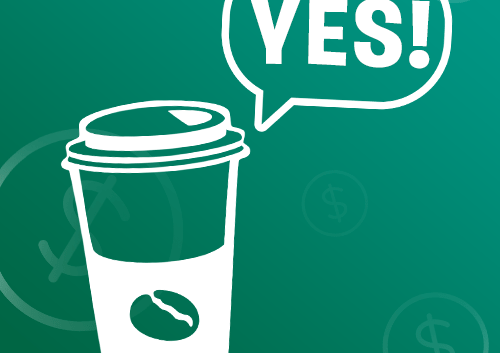- sales
- Blog post
A persuasive brew: Why reps may want to meet buyers at Starbucks
Are your reps having trouble persuading buyers to take the plunge? If so, maybe the sales force needs to start meeting customers at the coffee shop.
What the heck am I talking about? The aroma? The atmosphere? The ambiance?
No, no, and no. It turns out that, according to a piece of behavioral research out of Australia, people are more persuadable when they’ve ingested what the researchers called a “moderate amount” of caffeine. (The researchers suggest this comes to two or three cups of coffee.)
Beyond attention, to persuasion
It’s been known for a long time that moderate doses of caffeine — whether delivered in a cup of java, a can of cola, or a bottle of energy drink — improve both the level and the duration of people’s attention. If you imbibe, you’ve certainly noticed how that first cup of the day gets your brain engine running.
What’s new about the Australian study, though, is that it extends the research beyond attention and information-processing, and into persuasion, something salespeople are intimately concerned with.
The researchers had several dozen volunteers, under controlled dietary conditions, ingest a drink that either contained a moderate amount of caffeine or did not. The participants weren’t told whether their drink was “spiked” or not. Then all participants were given a number of arguments on one side of a controversial social issue, namely whether critically ill people should be allowed to end their lives. Finally, the participants were subjected to an equal number of arguments on the other side of the issue, and the researchers used an attitude-measuring scale to see how persuasive these latter arguments had been.
A durable influence
The researchers found that those who drank caffeine were significantly more likely to be persuaded by the counter-arguments than those who didn’t — as long as they weren’t distracted by outside influences. (The researchers introduced some distracting factors to measure this effect.)
What’s more, the caffeine-drinkers showed greater resistance to counter-counter-persuasion: In other words, once their minds had been changed by the initial counter-arguments, they tended to stay changed.
What appeared to be happening, the researchers said, was that participants paid better attention to information, and processed it more efficiently, when their brains had been “sharpened” by caffeine. This improved processing, in turn, led to increased persuasion.
Not a panacea
At this point, let me be clear about what I’m NOT saying. I’m not saying that getting prospects — or anybody you or your reps want to persuade — to drink coffee or other caffeine-laden beverages with you is some kind of panacea for low sales. Obviously it’s not so easy. Reps’ ability to persuade hinges on many things: attention to detail, persistence, ability to ask good questions and listen, etc., etc. All of these factors need to be aligned if sales are going to happen.
I’m also not asserting that having coffee time with buyers is something reps can do in 100% of cases. For one thing, there are a number of religions that either discourage or bar their adherents from drinking coffee or tea, including the Mormons, the Seventh-Day Adventists, and the Rastafarians.
But as an additional fillip to persuasion, sharing a moment with a prospect over a caffeinated drink looks like a pretty good bet, where appropriate. (Note: If you do decide to do this, you need to be able to spend more than a couple of minutes with your persuasion target. The researchers said it takes about 40 minutes for the maximum effect of caffeine to permeate the bloodstream.)

Get a demo of all our training features
Connect with an expert for a one-on-one demonstration of how BTS Total Access can help develop your team.


